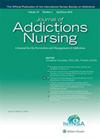Law Enforcement Perceptions About Naloxone Training and Its Effects Post-Overdose Reversal
IF 0.7
4区 医学
Q4 NURSING
引用次数: 1
Abstract
Abstract Background Law enforcement officers (LEOs) often are the first responders to arrive at a scene of an opioid overdose. Thus, equipping LEOs as first responders with naloxone is necessary to prevent overdose deaths and a recommended strategy. However, little is known about how LEOs perceive naloxone training and their feelings after using naloxone to save a life. It is important to understand LEOs' experiences with naloxone so as to develop additional training materials that are relevant to the LEO experience. Methods A descriptive exploratory study was conducted to explore the perceptions of LEOs about using naloxone in the field and to identify areas that should be included in future naloxone trainings. Interview data were obtained through face-to-face interviews with LEOs (N = 14) and analyzed using manifest content analysis. Results LEOs changed their attitudes and beliefs toward naloxone after receiving training and experiencing a successful resuscitation. The change in attitudes was enhanced after saving a life. However, misconceptions about naloxone and lack of understanding about disease of addiction persisted even after training. Conclusion Future naloxone curriculum could benefit from additional lessons on the stigma of addiction, the disease of addiction, misconceptions about the safety of naloxone, strategies for postoverdose responses, and the role naloxone, which might play in a hopeful recovery.执法人员对纳洛酮培训的认识及其药物过量逆转后的效果
背景执法人员(LEOs)通常是到达阿片类药物过量现场的第一个响应者。因此,为第一反应者配备纳洛酮是必要的,以防止过量死亡和推荐的策略。然而,对于低氧人群如何看待纳洛酮训练以及他们在使用纳洛酮拯救生命后的感受,人们知之甚少。重要的是要了解LEO使用纳洛酮的经验,以便编写与LEO经验相关的额外培训材料。方法采用描述性探索性研究的方法,探讨基层基层医务人员对纳洛酮临床应用的认知,确定未来纳洛酮培训应纳入的内容。访谈数据通过面对面访谈(N = 14)获得,并采用清单内容分析法进行分析。结果leo患者在接受培训和成功复苏后,对纳洛酮的态度和信念发生了改变。在拯救了一条生命后,态度的改变得到了加强。然而,即使在训练后,对纳洛酮的误解和对成瘾疾病的缺乏了解仍然存在。结论未来的纳洛酮课程可以从更多关于成瘾耻辱、成瘾疾病、对纳洛酮安全性的误解、过量反应策略以及纳洛酮可能在有希望的康复中发挥的作用等方面获益。
本文章由计算机程序翻译,如有差异,请以英文原文为准。
求助全文
约1分钟内获得全文
求助全文
来源期刊
CiteScore
1.20
自引率
6.70%
发文量
68
审稿时长
>12 weeks
期刊介绍:
Journal of Addictions Nursing (JAN) – JAN is the official journal of IntNSA and is a peer-reviewed quarterly international journal publishing original articles on current research issues, practices and innovations as they related to the field of addictions. Submissions are solicited from professional nurses and other health-care professionals engaged in treatment, prevention, education, research and consultation.
Each issue of the Journal of Addictions Nursing contains original full-length papers as well as several regular features sections:
· Perspectives features points of view and commentaries on relevant issues
· Media Watch provides summaries and critiques of print and digital resources.
· Innovative Roles examines unique roles that nurses in addictions are implementing
· Research Reviews offers summaries and critiques of research studies in the field

 求助内容:
求助内容: 应助结果提醒方式:
应助结果提醒方式:


